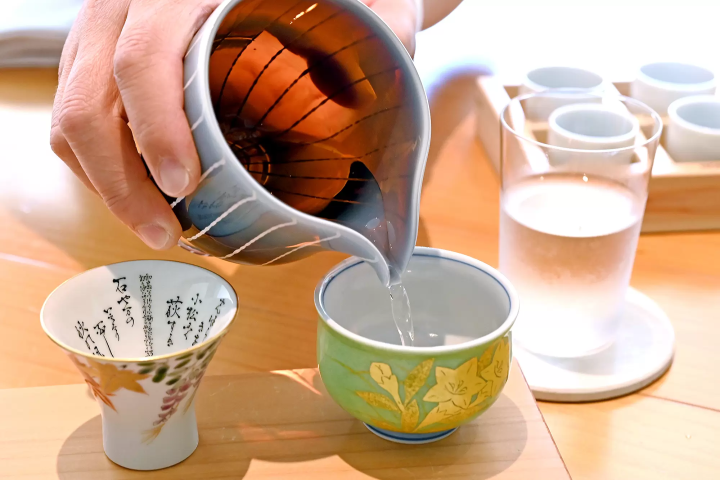Great Views and Beautiful Shrines! Traveling From Mishima to Hakone

Hakone and Mishima are located along Tokaido, the historical road that connected Kyoto and Tokyo in the past. A trip along this road is a chance to enjoy some of the best views of Mt. Fuji and visit majestic shrines and historical sites--an excellent day-trip itinerary from Tokyo.
Hakone and Mishima: Historical Sites and Great Views
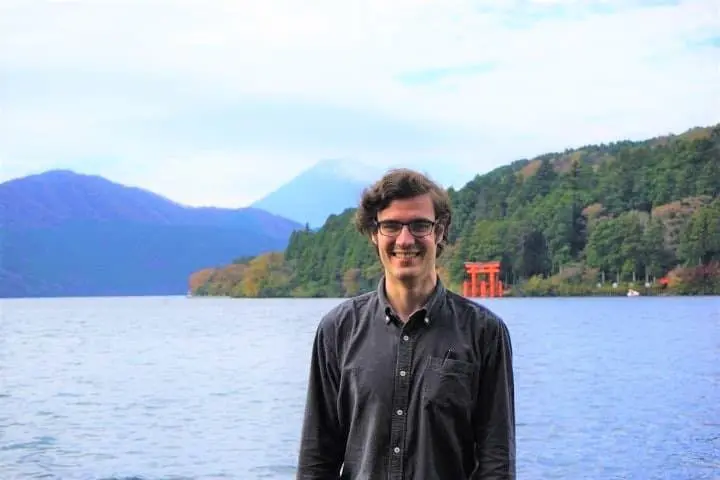
A trip to Mishima and Hakone is an excellent way to visit some of Japan’s most interesting and popular historical sites. Close enough for a day trip from either Tokyo or the Kyoto-Osaka area, Mishima and Hakone can also be experienced as part of an overnight trip that also includes neighboring Odawara.
While this article outlines a one-day trip to Mishima and Hakone, this itinerary also makes an excellent conclusion to a two-day adventure along the historic Tokaido Road (*1) that also includes a visit to Odawara Castle and Kamaboko Street, as well as additional sights in Hakone.
*1 Tokaido is the historical road that used to connect Kyoto and Edo (present-day Tokyo) in premodern times.
8:27-9:20 -- From Tokyo to Mishima
Traveling from Tokyo Station to Mishima is easy; the trip takes less than one hour by Shinkansen and a reserved seat costs 4,600 yen each way. On a clear day, you might even catch a glimpse of beautiful Mt. Fuji from the station!
9:50-10:45 -- Visit the Sacred Mishima Taisha Shrine
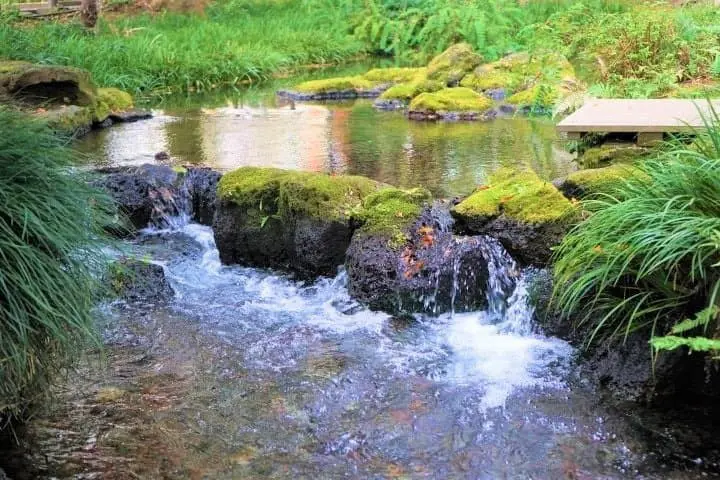
Once you arrive at Mishima Station, be sure to leave from the station's South Exit. It's quite difficult to circle around and reach the shrine from another exit. From the Shinkansen ticket gates, you'll walk about 200 meters underground before exiting at a bus stop.
Turn left from the bus stop, and head straight. After a 5 minute walk, you'll see Shirataki Park on your left. Take a moment to enjoy the park's natural ponds and river; these are fed by underground springs supplied by snow melt and rainfall from Mt. Fuji itself!
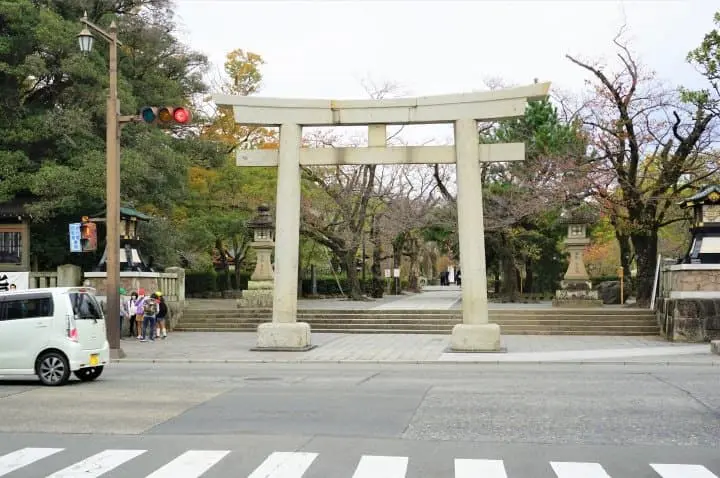
Follow the river another 5 minutes from Shirataki Park and you'll reach our first destination, Mishima Taisha Shrine.
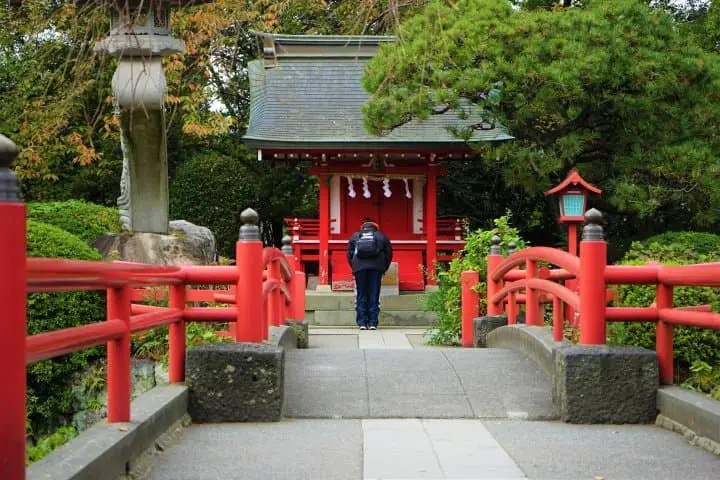
Mishima Taisha Shrine has over 1,200 years of history as a sacred site in the Hakone Hachiri area (*2). In fact, it is one of the highest ranking shrines in Shizuoka Prefecture. After being damaged by the great earthquake of 1854, the main hall of the shrine was rebuilt in 1866.
*2... Hakone Hachiri refers to the 32-km (8 li) part of the Tokaido road located between the historical post towns of Odawara and Mishima. This area has been designated a national heritage site of Japan.
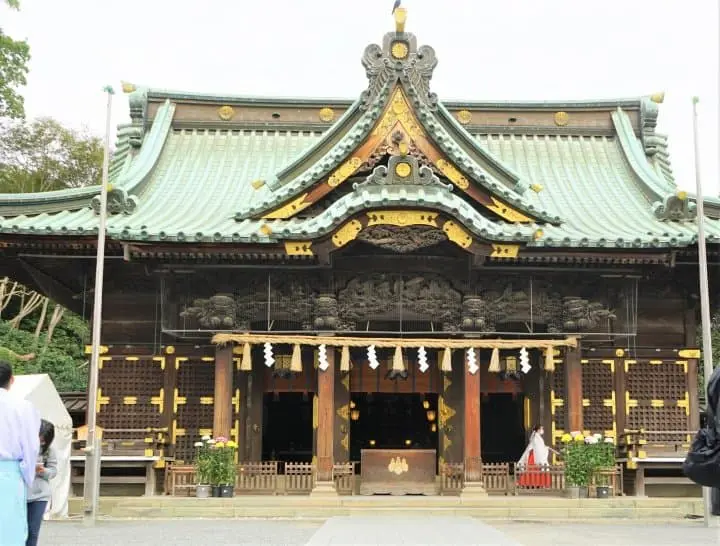
Several different Shinto deities are worshiped at Mishima Taisha Shrine, and the grounds contain a number of different, smaller shrines, as well as a museum that displays unique and beautiful sacred artifacts.
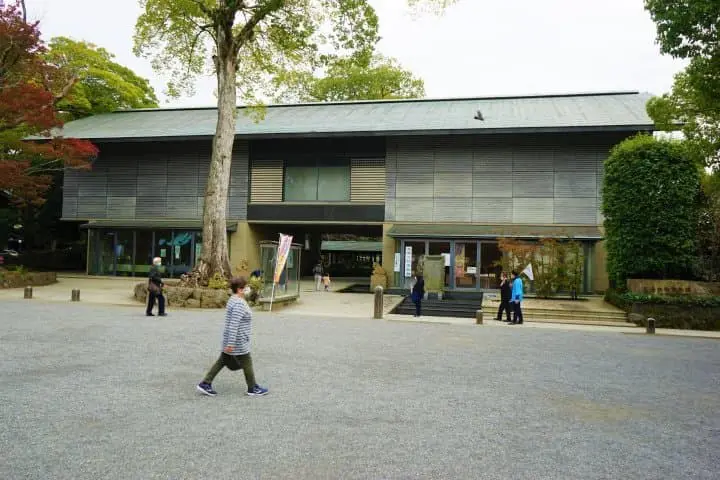
The museum displays are a great way to learn more about the history of Mishima Taisha Shrine, as well as some of the many famous samurai who supported this shrine throughout its history.
11:30-12:20 -- Climbing the Mountain Paths of Yamanaka Castle Ruins
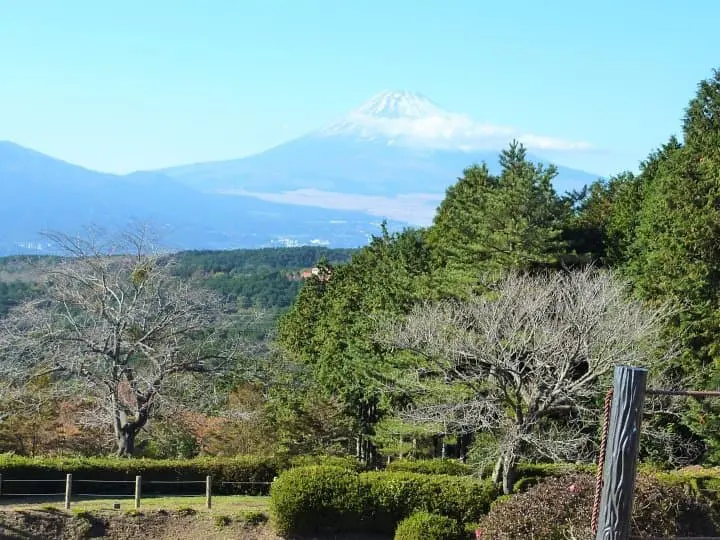
Picture courtesy of Hakone Hachiri Kaido Tourism Promotion Council
A 30 minute bus ride from Mishima Taisha-mae bus stop, right outside the shrine, to Yamanaka bus stop takes you to a rest stop at the base of a short mountain trail. This rest stop is a great place get lunch, or a snack.
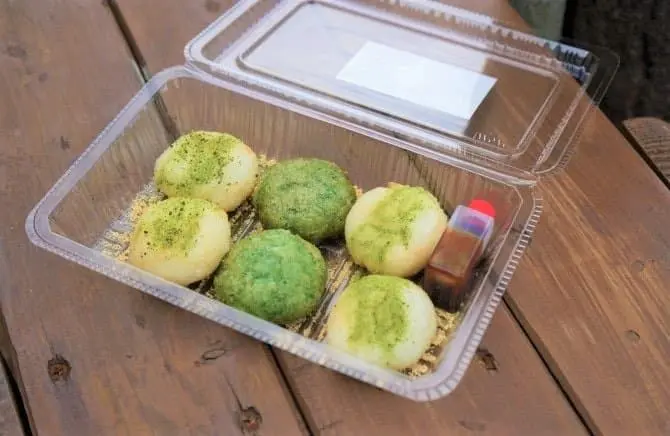
Be sure to try a delicious regional treat called Kanzarashi Dango, chewy fried rice dumplings covered with sweet, tangy miso paste!
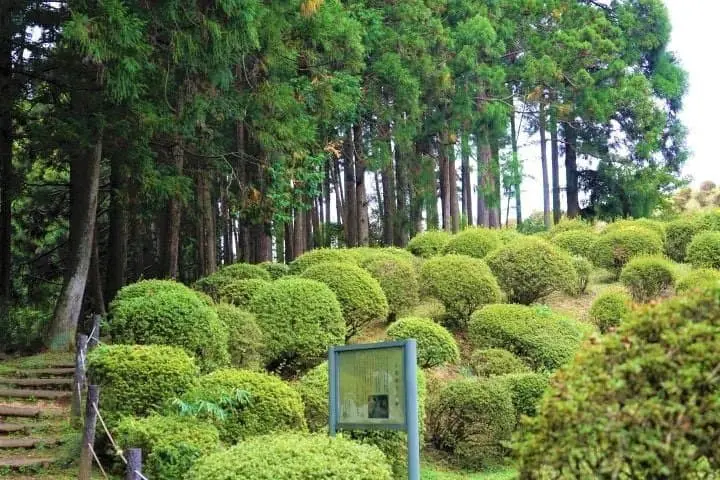
Once you're ready, head up the trail for a 30-minute hike to the Yamanaka Castle Ruins. This medieval fortress was originally built in the 1560’s to protect Odawara Castle from attack.
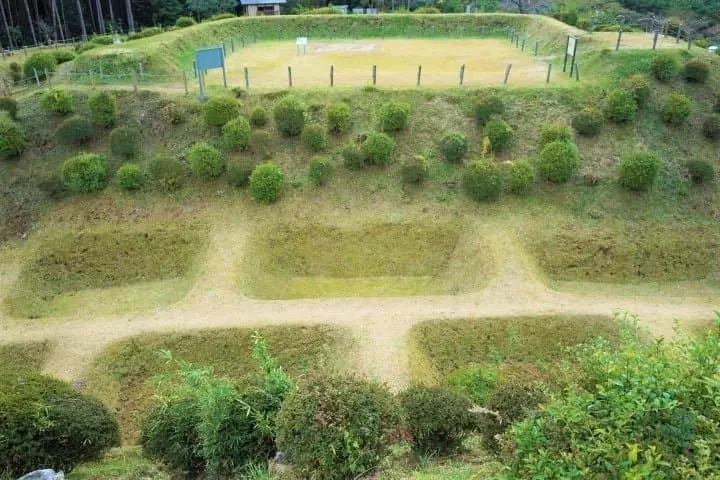
These defenses, known colloquially as “waffle pits” for their similarity to the popular breakfast food, had an important purpose. In order to avoid climbing into and out of every pit, approaching soldiers had to walk single-file along the narrow path that ran between the pits. This exposed them to attack by the archers and other warriors defending Yamanaka Castle. Falling into the pits meant not being able to advance freely, and they would become the targets of an even fiercer counterattack.
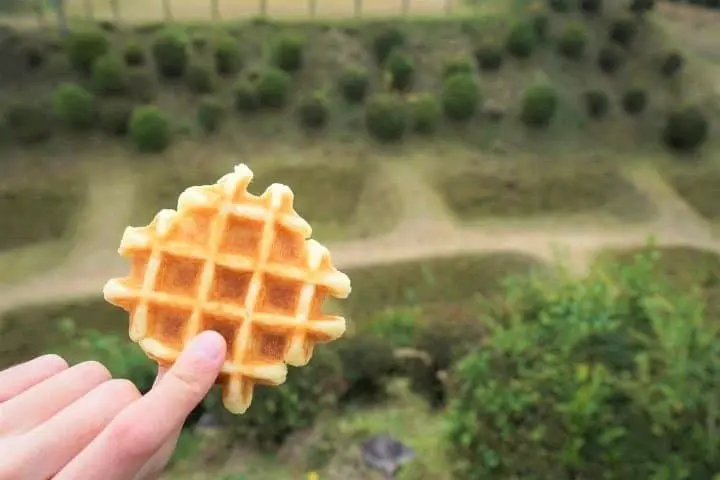
The samurai who established Yamanaka Castle believed that its defenses were strong enough to hold off an invading force for at least a month, giving Odawara Castle time to call for reinforcements if enemies attempted to invade. But when the regent Toyotomi Hideyoshi attacked Yamanaka Castle in 1590, his army captured it in a single day!
Although the castle itself is just a ruin, you can walk through the grounds and experience the famous “waffle pits” and other defensive works. It's also a great place to get pictures of Mt. Fuji!
13:00-14:00 -- Enjoying the Views From Hakone Pass
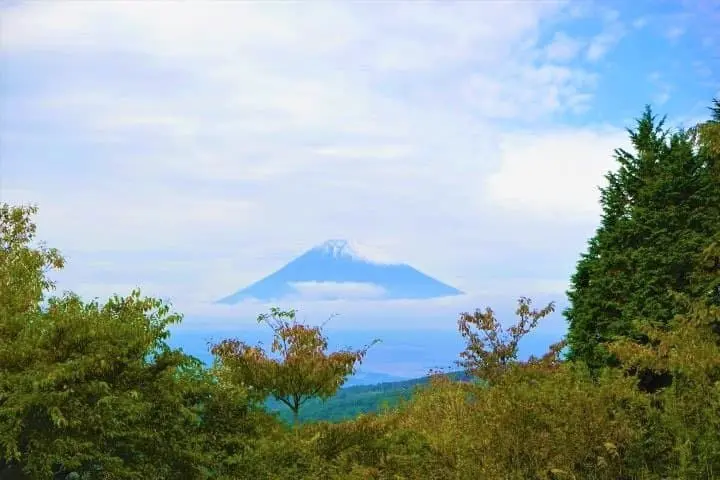
If you’re traveling by car, you can enjoy spectacular, panoramic views of majestic Mt. Fuji, the deep blue Lake Ashinoko, and the historic Hakone Jinja Shrine from the top of nearby Hakone Pass. The trip takes about 10 minutes by car from Yamanaka Castle.
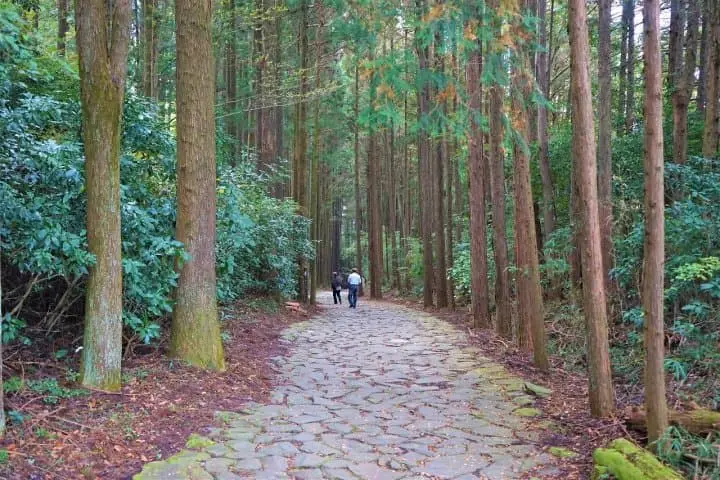
If you travel by foot, you can actually walk on a portion of the old Tokaido road. This paved path lined with tall cedars will give you an image of what Edo-period travelers felt while walking along the Tokaido.
14:30-15:30 -- Stepping Back in Time at the Hakone Barrier
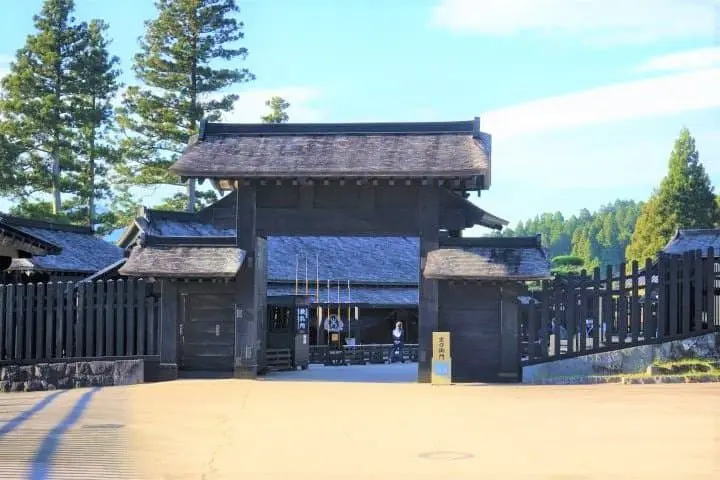
If traveling by public transportation, catch a bus from the Yamanaka Castle bus stop to Hakone Sekisho-Ato, a 20-minute trip.
This is the famous Hakone Barrier, which sits on the shore of Lake Ashinoko in nearby Hakone. Originally constructed in 1619, the barrier served as a checkpoint for inspection of travelers moving between Kyoto and Edo (now called Tokyo) during the Edo period (1600-1868).
The barrier has been rebuilt to its original state, using the same techniques and tools that were used in its construction. Its high, roofed gates and buildings make an impressive and imposing sight. The jet-black buildings are all covered with a special “paint” made from coal and persimmon, which is exactly the same as the type that was used in the 1600s.
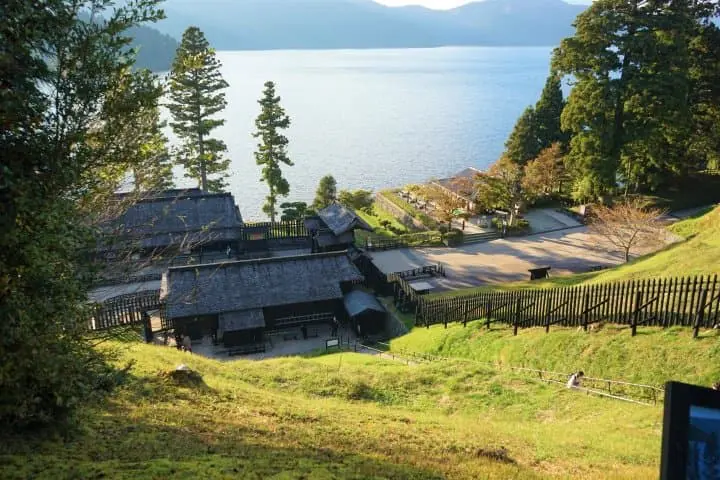
When visiting, be sure to climb the old stone steps to the barrier watchtower, which sits on a hill overlooking both the barrier and Lake Ashinoko. It has amazing views of the barrier and the sparkling lake. On clear days, you can even see Mt. Fuji from this historic overlook!
Admission to the barrier costs 500 yen for adults and 250 yen for children and includes access to the reconstructed buildings at the barrier, with many detailed displays that show how the samurai lived and worked at the barrier in Japan’s premodern times.
16:15-17:00 -- The Famous Red Gate of Peace at Hakone Jinja Shrine
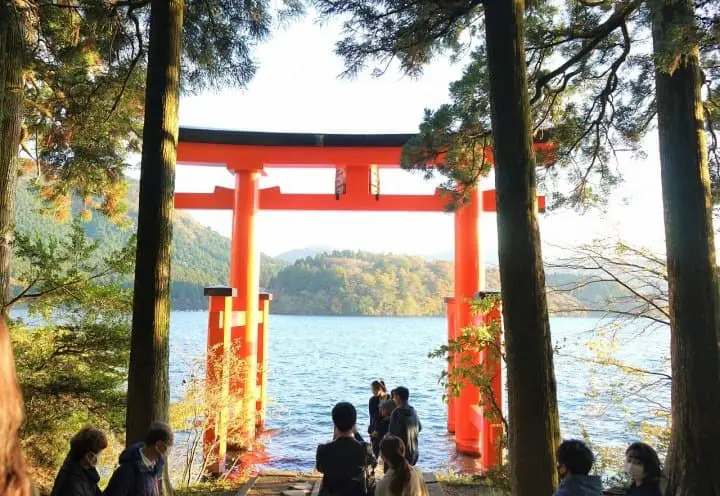
Hakone Jinja Shrine is a 10-minute bus ride, or a half-hour walk, from the Hakone Barrier, also on the shore of Lake Ashinoko. The shrine was founded during the eighth century and has been a popular destination for tourists, as well as worshippers, for over 1,200 years.
One of the shrine’s most famous features is the “red gate of peace,” a massive vermillion torii gate that stands in the water at the edge of the lake. A stone path leads across the water to the gate. When you stand on it, you feel almost like you are walking on the water!
The gate is a popular location for taking pictures—be sure to come early if you want to take a picture there, because when the shrine gets crowded there is usually a line.
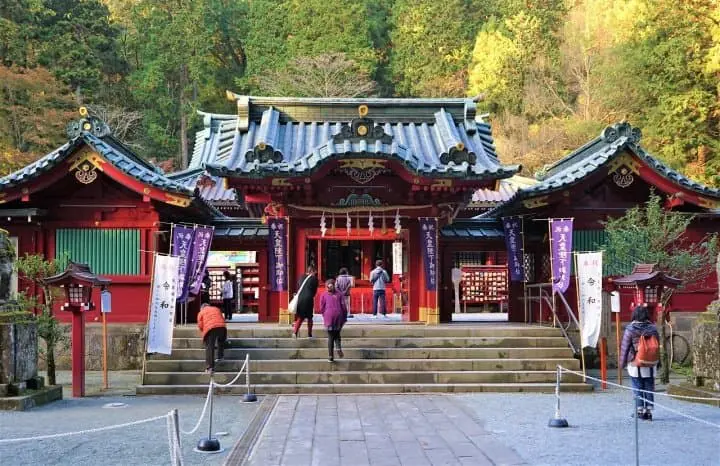
From the famous gate, a wide stone staircase leads you up a forested slope to the worship hall of Hakone Jinja Shrine. The path is lined with massive trees. In the early morning, mist gives the shrine a mystical, sacred feel, and in the afternoon, the trees provide cool shade for a comfortable walk.
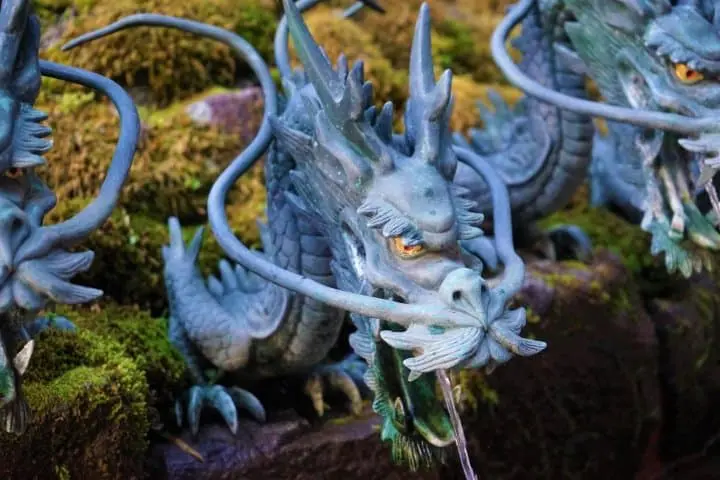
After vising the shrine’s main hall, be sure to stop at the nearby wishing fountain, where you can write a wish on a slip of special prayer paper, and watch it vanish in the fountain’s gentle current. If you try, I hope you get your wish!
After 17:40 - Back to Tokyo
To return to Tokyo, first hop on a bus toward Odawara Station (platform 2) at the Motohakone-ko Bus Terminal, which is very close to Hakone Jinja. At Odawara Station, take a Shinkansen toward Tokyo.
A Perfect Day on the Tokaido
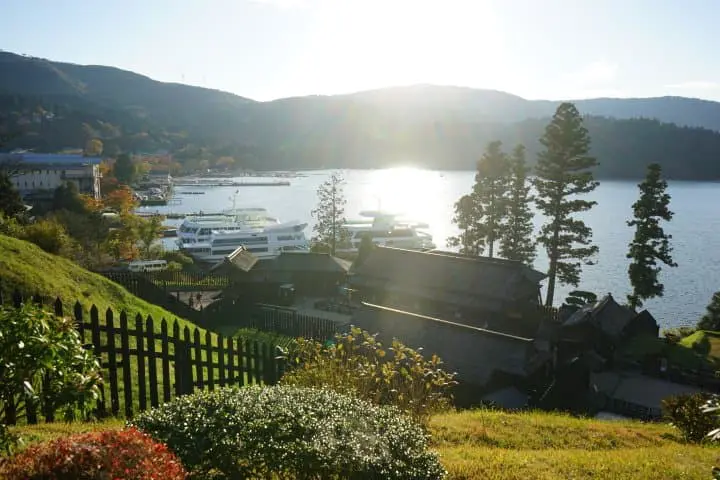
A day in Mishima and Hakone is a wonderful way to experience the highlights of this historic area, which was once an important part of the famous Tokaido Road that connected Tokyo and Kyoto.
From sacred sites like Mishima Taisha Shrine and Hakone Jinja Shrine to castle ruins, delicious treats, and spectacular views, Mishima and Hakone have it all!
For information on other great places to visit around Hakone, please visit the official website of Hakone Hachiri: https://hakonehachiri.com/
Route summary
Tokyo Station → Mishima Station → Mishima Taisha Shrine → Yamanaka Castle Ruins → Hakone Pass → Hakone Barrier → Hakone Jinja Shrine → Motohakone-ko Bus Terminal → Odawara Station → Tokyo Station
Expenses
Transportation (day-trip): around 12,000 yen
Entrance fees: about 500 yen
Lunch, snacks: about 2,000 yen
The writer visited these facilities on November 6, 2020.
Read also
Sponsored by Hakone Hachiri Kaido Tourism Promotion Council


































![[Kagoshima] Enjoy Minamisatsuma City to the Fullest! A Guide to the Scenic Beauty and Culture of Five Areas](https://resources.matcha-jp.com/resize/720x2000/2026/02/15-258755.webp)
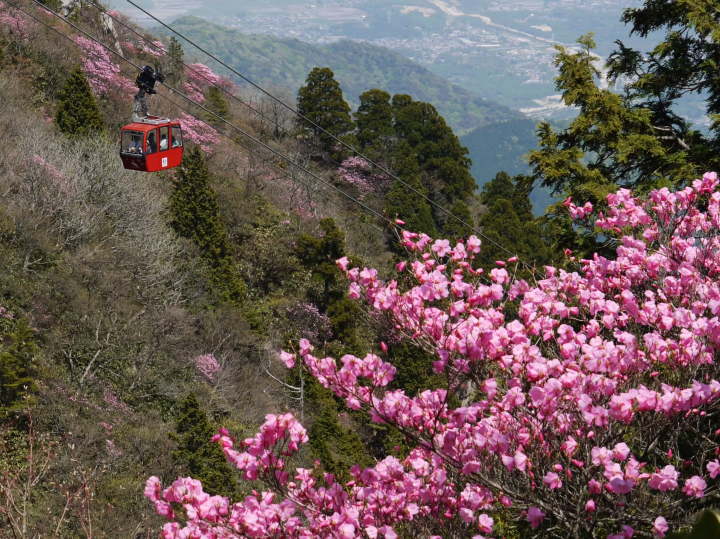
![[Yufuin]Yufuin in 100 Minutes: Quick Access Guide](https://resources.matcha-jp.com/resize/720x2000/2026/02/15-258738.webp)
![[Shinjuku Nishiguchi HALC] About the d Point Campaign](https://resources.matcha-jp.com/resize/720x2000/2026/02/14-258714.webp)
